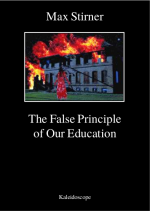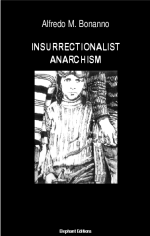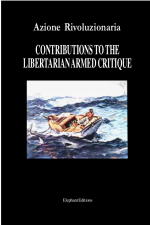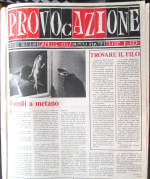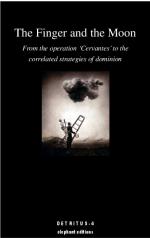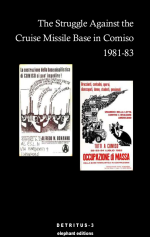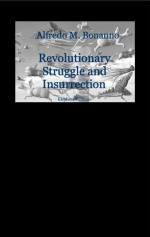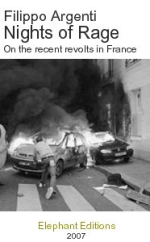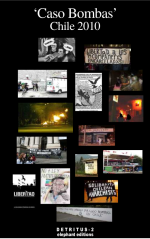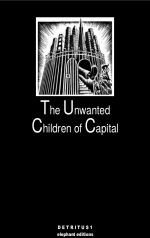Latest entries
Max Stirner
The False Principle of Our Education
Or — Humanism And Realism
Written as a reaction to Otto Friedrich Theodor Heinsius’ treatise Humanism vs. Realism, Stirner explains that education in either the classical humanist method or the practical realist method still lacks true value. Education, therefore, is fulfilled in aiding the individual in becoming an individual.
Feb 17, 2018 Read the whole text...
Alfredo M. Bonanno
Insurrectionalist Anarchism
Behind every aspect of anarchist insurrectionalist theory there is a project. I do not mean a lifeless picture complete in every detail, but a sufficiently identifiable project far beyond these pages and the many others that I have written on this tormented subject in my lifetime. Without taking this into account no analytical explanation will do much, it would risk remaining what it is, a set of words claiming to contest reality, an incongruously idealist claim. The fat plants of classical German philosophy have done all possible damage with their enticing stings, I hope that these are now no more than mere decoys.
Feb 17, 2018 Read the whole text...
Azione Rivoluzionaria Contributions to the libertarian armed critique
An armed revolutionary organization is an indispensable instrument in the struggle against oppression. This is beyond doubt. The problem arises with regard to the limits and structures that this organization must give itself in recognizing itself as a means and not as an end.
Jan 20, 2018 Read the whole text...
ProvocAzione – Editorials Anarchist Monthly January 1987 – May 1991
This paper was born from the need to accompany the review “Anarchismo” with an agile publication capable of developing ‘circumscribed and condensed’ analyses. Political and social analyses, leaflets, communiques and documents of the anarchist movement as well as of other groups and organisations, as well as many short and very short articles concerning attacks on the structures of power, news items testifying forms of spontaneous rebellion, that are manifesting themselves with different modalities and often turn out to be quite extraneous to the specific ambit of the anarchist or antagonist movement.
Starting from a series of analyses — concerning among other things, the modifications in the productive structures, the perfectioning of information technology, transformations in the world of work and school, the progressive cultural emptying — a perspective of struggle is outlined: not only the attack on the ‘great temples of death’, on the ‘visible complexes that attract everybody’s attention’ but also and principally small and often simple objectives, peripheral structures spread over the whole territory that are beginning to take on increasing importance for capital: factories, commercial structures, seats of power, but also electricity pylons, communications cables, everything that combines in the development of capital and the continuation of exploitation. These analyses and proposals precede the publication of ‘ProvocAzione’ in part, but in this paper they are gone into further and turn out to be still, valid at the present time.
Starting from a series of analyses — concerning among other things, the modifications in the productive structures, the perfectioning of information technology, transformations in the world of work and school, the progressive cultural emptying — a perspective of struggle is outlined: not only the attack on the ‘great temples of death’, on the ‘visible complexes that attract everybody’s attention’ but also and principally small and often simple objectives, peripheral structures spread over the whole territory that are beginning to take on increasing importance for capital: factories, commercial structures, seats of power, but also electricity pylons, communications cables, everything that combines in the development of capital and the continuation of exploitation. These analyses and proposals precede the publication of ‘ProvocAzione’ in part, but in this paper they are gone into further and turn out to be still, valid at the present time.
Jun 10, 2017 Read the whole text...
The Finger and the Moon From the ‘Operation Cervantes’ to the correlated strategies of dominion
Distributed by Cassa Anarchica di Solidarietà Anticarceraria, Latina, 2005.
May 24, 2017 Read the whole text...
The struggle against the Cruise missile base in Comiso 1981–83
Comiso in Sicily became a prime place on the NATO nuclear armaments map, having been chosen to house 112 cruise missiles. A prosperous commercial and agricultural centre, it is characterised by poverty and unemployment, a situation that prevails among Sicilian peasants and manual workers. In contrast to what was being said by the Italian government — that the missile base would bring wellbeing and jobs to the area — some local anarchists (comrades in Ragusa and Catania) decided to give a more realistic picture based on the social and economic effects that such a base would have, along with the organisational proposal to form self-managed leagues in all the area, which would coordinate to occupy and destroy the base.
Mar 28, 2017 Read the whole text...
Alfredo M. Bonanno
Revolutionary Struggle and Insurrection
Our task as anarchists, our main preoccupation and greatest desire, is to see the social revolution come about: a terrible upheaval of men and institutions which finally succeeds in putting an end to exploitation and establishing the reign of justice.
Mar 21, 2017 Read the whole text...
Filippo Argenti
Nights of Rage
On the recent revolts in France
This booklet is a modest contribution to understanding the recent revolts in France. Needless to say, it is not sociological or, in a nobler sense, theoretical insight. Revolts can only be understood by those who have the same needs as the rebels, that is to say by those who feel they are part of the revolt. After a brief chronology, in fact, the pages that follow pose the question of how the events of November in France concern all of us, and also try to give a possible answer.
Mar 19, 2017 Read the whole text...
‘Caso Bombas’ Chile 2010
CHILE RECENTLY DOMINATED WORLD HEADLINES through the much publicised rescue of 33 miners entombed in the Atacama desert after the dilapidated, unstable mine they were working in collapsed. When the ‘accident’ took place on 5 August, there seemed little hope of saving their lives.
9 DAYS LATER, on August 14, public prosecutor Ricardo Peña gave the order to set in motion “Operation Salamandra”, in which agents of the BIPE (Investigation Police) the ERTA , the GOPE (Special Forces of the Normal Police), LABOCAR (CSI) and a series of helicopters and police cars were used to carry out 17 spectacular dawn raids in Santiago and Valparaiso.
9 DAYS LATER, on August 14, public prosecutor Ricardo Peña gave the order to set in motion “Operation Salamandra”, in which agents of the BIPE (Investigation Police) the ERTA , the GOPE (Special Forces of the Normal Police), LABOCAR (CSI) and a series of helicopters and police cars were used to carry out 17 spectacular dawn raids in Santiago and Valparaiso.
Mar 18, 2017 Read the whole text...
The Unwanted Children of Capital
What is a CPT (the Italian for immigration detention centre)? It is a place where the Italian State locks up all immigrants (children, women and men) who do not have stay permits. It is a modern concentration camp where undesirables are confined before being deported.
Immigration detention centres exist all over fortress Europe, as the bosses establish that only certain immigrants are allowed to stay; the others, those whose face doesn’t fit and cannot be exploited as cheap labour, are locked up in prisons especially created for them and held until they are deported. They are ‘guilty’ of coming from lands where mere surviving is impossible, owing to famine and war, desertification and ecological disasters, industrial reorganisation and mass dismissal.
Immigration detention centres exist all over fortress Europe, as the bosses establish that only certain immigrants are allowed to stay; the others, those whose face doesn’t fit and cannot be exploited as cheap labour, are locked up in prisons especially created for them and held until they are deported. They are ‘guilty’ of coming from lands where mere surviving is impossible, owing to famine and war, desertification and ecological disasters, industrial reorganisation and mass dismissal.
Mar 18, 2017 Read the whole text...
Series
Fragments
Work in Progress
Anarchist Pocketbooks
Kaleidoscope
Anarchist Pamphlets
Bratach Dubh
Detritus
Drafts
Déjà vu
Insurrection (PDF)
Contact
e-mail: elephanteditions [at] riseup.net
Distributions
In Europe, Elephant Editions are distributed by Active Distribution
In the United States, Elephant editions are distributed by AK Press
In Italy, Elephant Editions are distributed by Edizioni Anarchismo
Other distributions please get in touch.

